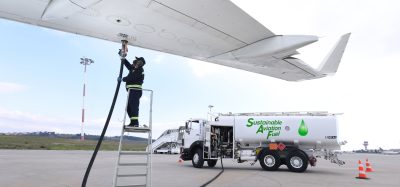Largest growth of carbon accreditations awarded to airports worldwide, reports ACI
- Like
- Digg
- Del
- Tumblr
- VKontakte
- Buffer
- Love This
- Odnoklassniki
- Meneame
- Blogger
- Amazon
- Yahoo Mail
- Gmail
- AOL
- Newsvine
- HackerNews
- Evernote
- MySpace
- Mail.ru
- Viadeo
- Line
- Comments
- Yummly
- SMS
- Viber
- Telegram
- Subscribe
- Skype
- Facebook Messenger
- Kakao
- LiveJournal
- Yammer
- Edgar
- Fintel
- Mix
- Instapaper
- Copy Link
Posted: 27 March 2023 | International Airport Review | No comments yet
Airports Council International (ACI) have reported the highest growth of Airport Carbon Accreditations awarded to airports. It shows the commitment airports have worldwide in mitigating their impact on greenhouse gasses and climate change.


More than half a million tonnes of CO2 reduced by the global community of airports certified by Airport Carbon Accreditation between 2021 and 2022
Airports Council International (ACI) have reported the highest growth of Airport Carbon Accreditations awarded to airports since its inception in 2009. The accreditations are the global carbon standard for airports founded and managed by ACI EUROPE on behalf of airports worldwide. The past reporting year ended with nearly 400 airports engaging in carbon management, with 89 of them achieving advanced levels. It demonstrate the commitment airports have worldwide in mitigating their impact on greenhouse gasses and climate change.
The past reporting year, running from May 2021 to May 2022, ended with 395 airports spanning 79 countries engaging in carbon management and reduction at one of the six program levels. The 91 new accreditations reported this year represent the highest growth since Airport Carbon Accreditation’s inception in 2009. Airports have also made great strides in progressing to more stringent levels of accreditation – 86 airports upgraded to a higher level of carbon management during the year, with 89 having now achieved advanced levels of carbon management.
Highlighted amongst the programme’s achievements are the sheer diversity of airports now certified. They include airports of all sizes: top global hubs such as London-Heathrow, Istanbul, Doha Hamad International, Singapore-Changi and Dallas Fort Worth are amongst the accredited rollcall, along with capital gateways in all continents such as Abidjan, Athens, Amman, Phnom Penh, Quito and San Jose. Equally, smaller airports serving remote areas, island nations and popular tourism destinations as diverse as Galapagos, Kelowna, Puerto Vallarta, Enfidha Hammamet, Trondheim and Sunshine Coast are proudly counted in their number.
The reporting period covers a timeframe when many airports were facing the profound impact of sluggish and fragile post-COVID-19 traffic recovery on airports’ financial and operational health. In this context, the results achieved serve to reconfirm airports’ unwavering determination to mitigate their impact on the climate.
Delivering tangible carbon savings
The latest carbon reduction and compensation results achieved by the airport industry are equally record-breaking. In the period covered, accredited airports succeeded in collectively reducing the CO2 emissions under their control by 549,643 tonnes, a reduction of -8.1%. This is the largest reduction ever achieved through the program. In addition, 898,821 tonnes of CO2e were compensated with high quality carbon credits, in line with ACI EUROPE’s Offsetting Guidance based on a qualitative assessment of the compensation mechanisms and offset types available on the market.
Niclas Svenningsen, Manager for Programmes Coordination at the United Nations Framework Convention for Climate Change (UNFCCC) said: “The results announced today speak volumes of the global airport industry’s commitment to fighting climate change. Against the backdrop of worsening climate impacts and the window of opportunity to keep the warming below 1.5°C rapidly closing, we need all parts of our global economy to act now. Airports have clearly understood this message and are on the front line of climate mitigation within their spheres of influence and lending their impetus to other industry actors. I commend each and every airport engaged in this collective effort to advance the decarbonisation of the airport industry globally.”
ACI World Director General Luis Felipe de Oliveira said: “The record-breaking results of the ACI Airport Carbon Accreditation programme are great achievements by the world’s airports. Founded by ACI EUROPE, this programme has become a global success—as reflected in its year over year growth. Congratulations to all 395 airports, spanning 79 countries across all ACI Regions, that have engaged in carbon management and reduction. Despite the challenges brought on by the impact of the pandemic, the airport industry continues to demonstrate its commitment to net zero carbon emissions for international aviation by 2050, in line with the Paris Agreement.”
ACI EUROPE Director General Olivier Jankovec said: “The Airport Carbon Accreditation programme is at the heart of what decarbonising an industry like aviation must be about: aspirational yet deeply practical and actionable, charting not only achievements today but the way forwards for tomorrow. Airports know well the role they play in their communities and the expectations that air passengers have with regard to our shared responsibility for the climate and environment. The Airport Carbon Accreditation programme provides a framework for measurable progress and demonstrable results. We are intensely proud of the achievements to date, and the appetite for continued change.”
Alignment with the Paris Agreement
The latest addition to the programme framework, Levels 4 (Transition) and 4+ (Transformation), require airports to align their carbon management and reduction trajectory with the objectives of the Paris Agreement, according to which global warming should be limited to below 2oC and ideally 1.5oC. Their creation back in July 2019 marked a step-change in the programme’s ambition level, laying the ground to accompany airports of all sizes and locations to reach Net Zero CO2.
The number of airports accredited at these levels reached 321 in the reporting period, pointing to the airport community’s readiness to pursue full decarbonisation in line with, or in some cases even more rapidly than the timelines enshrined in the global climate goals.
The 2021-2022 Airport Carbon Accreditation Annual Report can be downloaded here.
Related topics
Airport Carbon Accreditation (ACA), Airport development, Airside operations, Emissions, Social responsibility, Sustainability, Sustainable development
Related airports
Dallas Fort Worth International Airport (DFW), Doha Hamad International Airport (DOH), Istanbul Airport (IST), London Heathrow Airport (LHR), Singapore Changi Airport (SIN)
Related organisations
Airports Council International (ACI Europe), Airports Council International (ACI)
Related regions
Asia Pacific and Oceania, Central and South America, Central and South Asia, Europe, Middle East, North America, United Kingdom and Ireland
Related people
Luis Felipe de Oliveira, Niclas Svenningsen, Olivier Jankovec


















